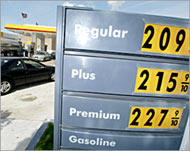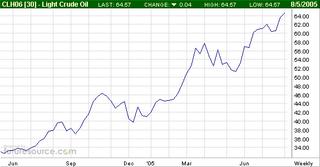The power of accurate observation is often called cynicism by those who have not got it.
George Bernard Shaw.
As we all race to convert the fictitious new capital in our properties into Toyota Prados, LCD screen TVs, and package holidays to the Gold Coast cluelessness in regard to the global energy/economic situation continues unabated.
The single most important ingredient for economic growth is increased energy consumption yet most New Zealanders including a sizable gaggle of dense politicians are yet to make this connection. Energy is the capacity to do work, no energy, no work. Yet energy is taken for granted. At least it has been until about now.
As the price of a barrel of oil continues to march skyward those with a modicum of wetware between the ears have begun asking “why?” There are various ways to answer this question for now I’m sticking to a simple explanation and it can be expressed in a single word - scarcity.
Rampant demand growth for oil across the developed and transitioning economies can simply be translated as desire. Our collective desire for all manner of techno-gadget consumer products, McMansions, V8 SUVs, speedboats, individually wrapped plastic packaged food, weekend recreational shopping and tropical holidays, that is, our greed driven desire for material success grossly exceeds our ability to be happy with what we have got. We are alcoholics to utility maximisation, drunk on instant gratification and heavily in debt because of it. If consumer products were drugs we’d all be lining up at the door of the Salvation Army.
The reason the price of oil is so high is a direct result of out of control desire effectively increasing the scarcity of the resource. The fall of the iron curtain and consequent proselytization of western style individualism and democracy throughout the world has created unprecedented levels of desire for more and more “stuff”. And the only way to ensure we get to
have this stuff is through continued economic growth. The demand to burn increasing amounts of oil necessarily follows.
Thus, as a consequence some might argue of the exploding global capitalistic society within which we live, it is ourselves that have driven the price of oil to its current level. Don’t blame the oil companies blame yourself. And if enlightenment philosopher David Hume was correct in that “all conflict springs from scarcity” the roller door to the double garage of self-destruction has already been opened. Iraq and Iran both swim on a sea of oil and everybody wants it. We want it so bad we are prepared to die for it.
If the current price of petrol, indeed oil were not enough to irritate you, dampen your economic confidence, the looming spectre of “Peak Oil” is certain to rain heavily on the current consumption parade.
We are almost at the point at which half the entire global endowment of oil has been consumed, discovery of oil peaked in the 1960s and despite all technology and the scouring of the earth for more, discovery has steadily declined since. Today we burn almost 84 Million barrels per day. Andrew McKillop an energy economist, argues we will be lucky to increase this figure to a maximum 90 Million barrels, at this point increasing depletion and continued demand will offset new discovery – we’ll be going backwards. With demand growth running at about 3 million barrels per year the current economic world party is likely to last at most another few years – maybe another term of Government.
Already many of the world’s large iconic oil regions are in decline, the North Sea, Norway, arguably or very soon Saudi Arabia. By the end of this decade the western industrial world will descend into a surreal hyper-scarcity miasma. If you think petrol is expensive now, just wait another year or two. Supply of the black oozy lifeblood of the economy will begin shrinking by about 3% per year. Economic growth throughout the western world will end abruptly as hyper-inflated oil prices become structural shortages! Hume’s conflict will manifest itself at the service station as well as the streets of Baghdad.
Some New Zealand politicians (Greens, Labour although it’s not admitting it yet) have already realised this scenario is just around the corner. Some with all the hubris of schoolyard bullies continue to laugh about it (ACT, National, United Future). With an election looming PowerLess NZ invites New Zealanders to make the distinction. Simply email your politician and ask them how they are planning today for peak oil – building more roads obviously is not the correct answer (nor for that matter is dropping out of Kyoto). Don’t accept feel good newspeak answers.
The remainder of this decade will be increasingly defined by energy or a lack thereof. Voters ought to consider this issue seriously; our collective continued well being depends on action now. Well prepared, New Zealand could be well placed to weather such a storm but preparation will require intensive national effort in order to dramatically reduce our dependence on fossil fuels. This election make the right decisions so that the effort can begin.
Steve McKinlay for
Powerless NZ
18 August 2005




